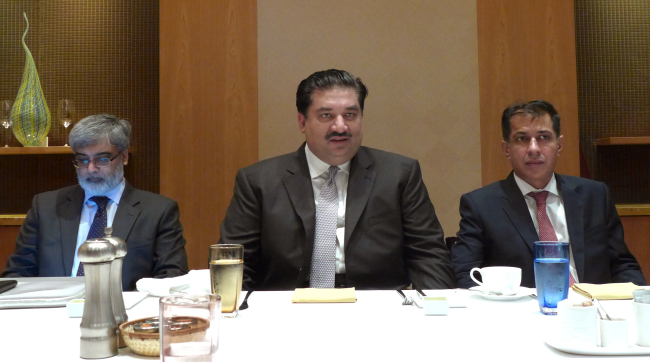Pakistan provides Central Asian connection for Korean business
By Korea HeraldPublished : July 13, 2015 - 00:29
Pakistan is poised to grow as part of the global economy and a safer investment haven, the country’s Federal Minister for Commerce Khurram Dastgir Kahn told journalists last week.
Khan visited Seoul to expand economic cooperation and elicit Korean investment in Pakistan, building on former Korean Prime Minister Chung Hong-won’s visit to Islamabad in April last year.
He participated in the first annual meeting of the Pakistan-Korea Joint Trade Commission Wednesday, as both countries seek to launch a full-scale free trade agreement.
Khan visited Seoul to expand economic cooperation and elicit Korean investment in Pakistan, building on former Korean Prime Minister Chung Hong-won’s visit to Islamabad in April last year.
He participated in the first annual meeting of the Pakistan-Korea Joint Trade Commission Wednesday, as both countries seek to launch a full-scale free trade agreement.

“Our economy is well positioned to take off,” Khan stressed, adding that the “extremism and terrorism that has threatened Pakistan for the last 10 years have dwindled markedly.”
Due to terrorism, many major international airlines did not fly to Pakistan and investors preferred to do business in Dubai or Singapore instead, he said.
“But our military and intelligence actions targeting terrorism have strengthened law and order substantially,” he argued. “Our government aims to give young people hope through economic growth and employment, so that they stay away from extremism and terrorism.”
Khan pointed to improved macroeconomic indicators, which have boosted investors’ confidence and Pakistan’s engagement with the world economy. International credit rating service Moody’s raised its outlook for Pakistan from negative to stable to positive between 2012 and 2015.
The government has also reduced deficits, divested shares of state-owned enterprises and successfully adapted to the international bond market, Khan said.
“We are partners in growth,” the minister stressed. “Korean businesses can be part of Pakistan’s expanding economy, estimated to have a GDP of $270 billion with 4.2 percent growth last year.”
Pakistan aims to develop its transport infrastructure, energy infrastructure, logistics and mining. Agriculture and food processing, particularly meat and poultry, are also ripe for investment, he added.
To fill energy shortages by 2017, Pakistan aims to import electricity from China and Tajikistan, and gas from Turkmenistan.
“Pakistan’s geostrategic location acts as a ‘fulcrum’ between Central and South Asia,” Khan claimed. “With our Asian partners, we want to transform our diplomatic friendships into economic partnerships.”
He added, “Pakistani companies that have long looked to the West for trade and investment are increasingly looking east.”
As China’s east end is Korea and west end is Pakistan, and China has free trade agreements with both countries, the minister said, Islamabad and Seoul should sign an FTA to complete the triad.
Pakistan has exported textile, yarn and metal to Korea for decades, and aims to expand the export’s scope and range.
Bilateral trade amounted to $1.2 billion last year, with the trade balance in favor of Korea: Pakistan imported $700 million from Korea and Korea imported $500 million from Pakistan.
Cumulative Korean investment is $140 million. POSCO, Hyundai, Samsung, LG, Lotte and Sambu-Daewoo have set up businesses and factories in Pakistan in the construction, electronics, energy and food sectors.
Korea’s EximBank has agreed to provide $50 million to construct an information technology park in Islamabad and a special children’s hospital will be built in the southeastern province of Sindh with Korea’s assistance.
Pakistan’s first motorway, which runs 367 kilometers between Lahore and Islamabad, was built by a Daewoo construction company in the early 1990s. Most Pakistanis associate Korea with the highway, which has become a landmark, Pakistani Ambassador Zahid Nasrullah Khan said.
Minister Khan highlighted the ambitious China-Pakistan Economic Corridor project ― a $46 billion Chinese investment in Pakistan’s highways, ports, transmission lines and energy pipelines ― which will be open to international investors.
“The project raised Pakistan’s international profile as an investment destination, and raised investors’ confidence in our country,” he underscored. “It is significant in the context of the opening of Iran, as Pakistan wants to include Iran in the corridor.”
As part of the scheme, the Gwadar Port in southwestern Pakistan on the Arabian Sea would open routes to Afghanistan, Turkmenistan, Uzbekistan, Kyrgyzstan and Kazakhstan. Korean companies can participate in joint projects in Afghanistan, and build the “Central Asian connection” through Gwadar, the minister noted.
“So many of our sectors are underdeveloped that if you are willing to bring in new management and technology into any part of the economy, you will be met with opportunities,” he claimed, adding that workers could work for many multinational firms in Pakistan.
Unfortunately, the relations between Pakistan and India have not improved under the governments of prime ministers Nawaz Sharif and Narendra Modi, Khan added.
“The current situation is not conducive to taking our relationship forward. (But) despite the diplomatic tension, bilateral trade has continued, ranging between $2.5 (billion) and $3 billion a year.”
Khan argued that the young professionals visiting Pakistan will get an “exotic feel” of a country on the cusp of development.
“Living in Pakistan may be comparable to Korea 30 years ago,” he said. “We have a very colorful culture, with different styles of cultural expression in music, art, theater, clothes and food.”
Pakistan also has a diverse terrain and climate, from the high mountains in the north to the southern seas and everything in between. A steady stream of Korean tourists travel to Pakistan’s “majestic north” for mountaineering, according to the ambassador.
11,000 Pakistanis currently live in Korea, including some 1,000 students, 1,000 laborers and a great number of businesspeople. Over 1,000 Pakistanis have married Koreans and settled here since the late 1980s.
By Joel Lee (joel@heraldcorp.com)
-
Articles by Korea Herald




![[Herald Interview] 'Amid aging population, Korea to invite more young professionals from overseas'](http://res.heraldm.com/phpwas/restmb_idxmake.php?idx=644&simg=/content/image/2024/04/24/20240424050844_0.jpg&u=20240424200058)












![[KH Explains] Korean shipbuilding stocks rally: Real growth or bubble?](http://res.heraldm.com/phpwas/restmb_idxmake.php?idx=652&simg=/content/image/2024/04/25/20240425050656_0.jpg&u=)

